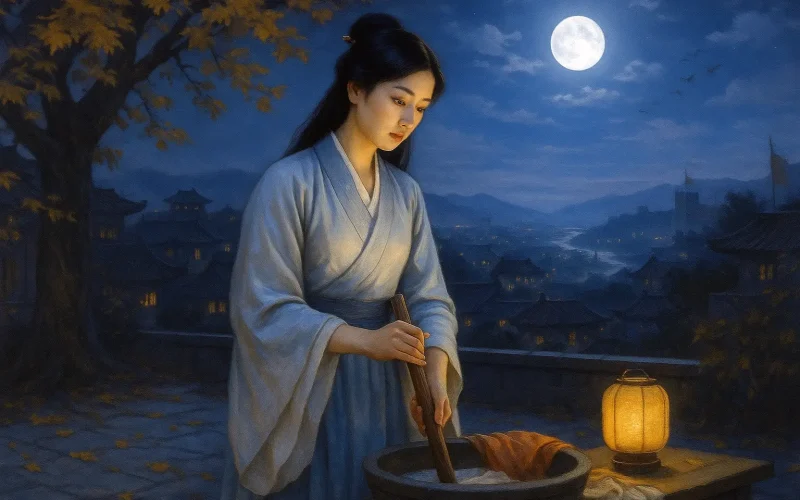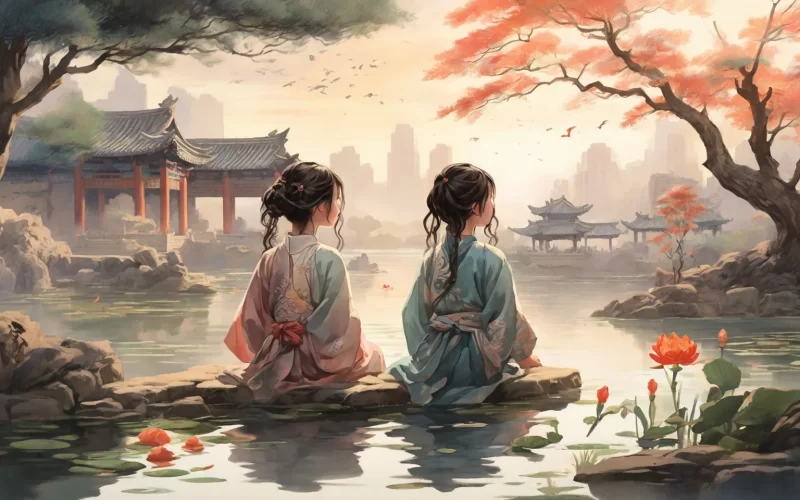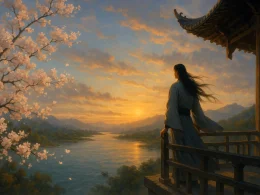A slip of the moon hangs over the capital;
Ten thousand washi ng-mallets are pounding;
And the autumn wind is blowing my heart
For ever and ever toward the Jade Pass...
Oh, when will the Tartar troops be conquered,
And my husband come back from the long campaign!
Original Poem
「子夜吴歌」
李白
长安一片月, 万户捣衣声。
秋风吹不尽, 总是玉关情。
何日平胡虏, 良人罢远征。
Interpretation
This poem, titled "Autumn Song," is the third in a series of four yuefu poems by Li Bai. While drawing upon the tradition of Southern Dynasties Wu-style love songs, Li Bai elevates the form to new heights. Set against the autumn nightscape of Chang'an, the poem uses the quintessential scene of "ten thousand households pounding laundry" to intertwine personal longing with the fate of the nation, expressing the people's profound yearning for peaceful life.
First Couplet: "长安一片月,万户捣衣声。"
Cháng'ān yīpiàn yuè, wànhù dǎoyī shēng.
One sheet of moonlight blankets Chang'an; Ten thousand homes pound laundry in the night's span.
The opening unfolds with a grand perspective: "One sheet of moonlight" illuminates the entire city, creating a lucid yet boundless atmosphere; "Ten thousand homes" reveals this is not an individual act but a universal social phenomenon. The fusion of moonlight and pounding sounds creates synesthesia—the moonlit night should be tranquil, yet it's broken by the incessant pounding that carries the longing and labor of countless women. "Pounding laundry," this quintessential autumn chore, becomes an emotional link connecting countless families with their distant men at the frontier.
Second Couplet: "秋风吹不尽,总是玉关情。"
Qiūfēng chuī bù jìn, zǒng shì Yùguān qíng.
The autumn wind blows without cease; It's always thoughts of Jade Pass that never release.
This couplet materializes intangible longing. "The autumn wind blows without cease" is a masterful double entendre: it describes the wind's endless blowing, and metaphorically suggests the longing that cannot be dispersed or severed. "Thoughts of Jade Pass" crystallizes the theme, channeling the preceding imagery into concern for loved ones guarding the frontier. Jade Pass, symbolizing the border, creates a spatial opposition with Chang'an, intensifying the ache of separation across the distance.
Third Couplet: "何日平胡虏,良人罢远征。"
Hé rì píng húlǔ, liángrén bà yuǎnzhēng.
When will the northern tribes be pacified, So our men may end their long campaign and return homeward?
The conclusion poses the most direct yet profound question. "When" conveys anxious uncertainty and urgent hope; "our men ending their campaign" is the simplest, most genuine wish of every family. This transcends personal sorrow, rising into a collective cry for peace. Notably, the poet intimately connects personal sentiment ("our men") with state affairs ("pacify the tribes"), imbuing this seemingly delicate poem with deep social significance and the spirit of its era.
Holistic Appreciation
The poem's artistic achievement lies in its unique technique of "revealing grandeur through subtlety, conveying strength through tenderness." Beginning with minute, everyday images—"one sheet of moonlight," "pounding sounds"—the poet unveils the collective emotional landscape of an entire society under the shadow of war. The poem's conception expands progressively: from Chang'an's moonlight, to the pounding in myriad homes, to the soldiers at Jade Pass, finally extending to the hope for universal peace, creating a layered spatial-temporal tension. Though focused on personal love, it carries a heroic spirit; though merely thirty characters, it articulates the sacrifices and hopes of countless ordinary families behind the High Tang's glorious facade.
Artistic Merits
- Precise Selection and Combination of Imagery: The overlay of four core images—"autumn moon," "pounding sounds," "autumn wind," and "Jade Pass"—constructs a complete emotional field possessing seasonal characteristics, geographical span, and emotional depth.
- Technique of Blending Reality and Abstraction: The first two lines depict reality; the latter two express emotion. Real scenes evoke abstract feelings, which in turn imbue the scenes, achieving perfect integration of emotion and setting.
- Fusion of Folk Song Charm and Literati Sentiment: The language maintains the freshness and natural rhythm of yuefu folk songs, yet its connotation far surpasses ordinary love songs, demonstrating Li Bai's creative development of the old yuefu themes.
Insights
This masterpiece, traversing over a millennium, still touches the softest parts of our hearts. It reminds us that behind grand historical narratives lie the joys and sorrows of countless individuals. The longing for reunion and peace in the poem is a universal, eternal human emotion. In today's fast-paced society, it also prompts reflection: Do we overlook those silent waits and deep devotions? Do we cherish the seemingly ordinary reunions of the present? Li Bai's greatness lies in making a single Chang'an moon illuminate all separated and hopeful hearts across time.
Poem translator
Kiang Kanghu
About the poet

Li Bai (李白), 701 - 762 A.D., whose ancestral home was in Gansu, was preceded by Li Guang, a general of the Han Dynasty. Tang poetry is one of the brightest constellations in the history of Chinese literature, and one of the brightest stars is Li Bai.












